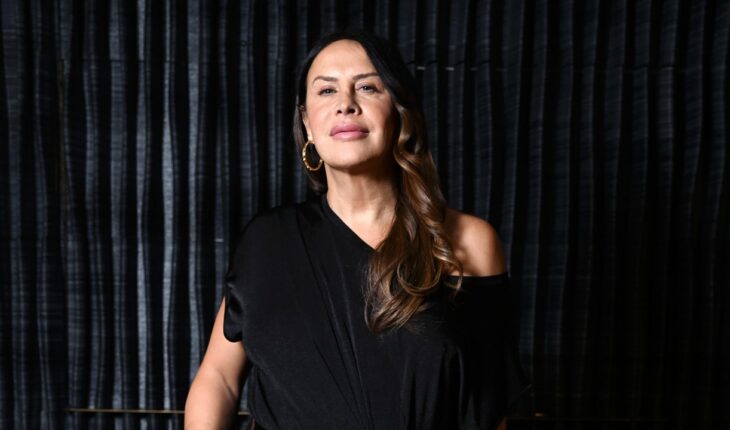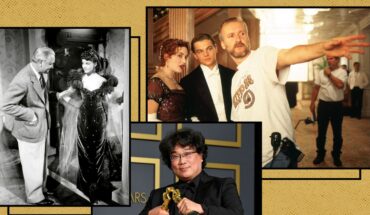To my naive surprise on this chilly Friday morning, Karla Sofía Gascón seems right at home. On the brunch patio of a lux Palm Springs hotel, upon which virtually every 2025 Oscar contender has descended to kick off the new year for a starry gala, the Emilia Pérez star grabs a corner table for us mere feet away from Stanley Tucci, star of the major contender Conclave, and even closer to Anora’s Mikey Madison, a fellow industry breakout in the stacked best-actress race. At one point, Oscar-nominated director Denis Villeneuve (Dune: Part 2) hovers behind me while Gascón speaks, waiting his turn to share some words of praise. This is how it’s been for more than seven months now—and for a performer nowhere near these glitzy gatherings for much of her decades-long career. “It’s full-on madness,” Gascón tells me later. “Intense, tiring—but also I’ve been very moved many times.”
I first met Gascón last May, sitting beside her Emilia Pérez costars Selena Gomez and Zoe Saldaña on a rooftop in Cannes, France, as the madness was just beginning. Their audacious film—a trans-centered, Spanish-language, crime-driven musical helmed by French auteur Jacques Audiard—had just premiered on the Croisette to great enthusiasm, and most everyone left that screening with two big questions: What the hell did I just watch? and Who is Karla Sofía Gascón? Starring opposite two American superstars, the Spanish-born Gascón, known to that point for her work in Mexican telenovelas, proved revelatory in the title role. The movie won two prizes at the festival (including a joint best-actress win for the ensemble), was picked up for an awards-bound release by Netflix, and started traveling the globe. Gascón’s life began changing fast.
Now she’s a Golden Globe and Critics Choice nominee, poised to become the first openly trans actor in history to receive an Oscar nomination. (Elliot Page, nominated in 2008 for Juno, came out as trans in 2020.) “I think I’ve done my job when it comes to acting, and the awards and nominations, that’s a plus,” Gascón says through a translator, who sits between us. “I put my best work forward. But I’ve made history in cinema with my work—my message to the world is much bigger.” At Sunday night’s Golden Globes, Emilia Pérez won four prizes, the last of which—best picture (musical/comedy)—allowed Gascón to close out the night with a stirring speech.
“You can put us in jail, you can beat us up, but you never can take away our soul, our existence, our identity,” she said. “I want to say to you: Raise your voice for freedom. I am who I am, not who you want.”
Emilia Pérez follows a cartel leader who enlists the help of a disillusioned but brilliant lawyer (Saldaña) to secretly facilitate her gender-affirming care. The film’s first act finds Gascón portraying Emilia before her transition, an unexpected choice for Audiard, who assumed she wouldn’t want to play that until she insisted on it—eager for the challenge. The actor highlights this, surprisingly, as the most comfortable aspect of her performance: “It was completely outside of myself. I was being led by the character. I was playing a Frankenstein.” When it came to taking on Emilia in the film’s back half—when she falls in love, faces her demons, and reunites with her estranged wife (Gomez) and kids—Gascón dug deep.
The resulting turn, soulful and tender and coursing with unresolved pain, has landed Gascón on this Palm Springs patio, approaching the final act of a groundbreaking candidacy that’s taken filmmakers around the world by storm. Indeed, Villeneuve is not alone. I’ve attended several Academy screenings in Los Angeles where it’s played to standing ovations, and Gascón has found love from some iconic figures. (“So good,” Annette Bening raved to me on her way out of an event she hosted for the film at CAA.) There are several A-list names Gascón shares with me off the record, who’ve reached out personally. She’s been deemed award-worthy by everyone from the prestigious European Film Academy (where she won best actress, a key Oscar precursor) to the New York Times’ chief film critic.
Yet with making history comes responsibility—and pushback. “I have more media power, I have more people listening to my words, and I have much more impact in what I say, bringing hope to others,” she says. “I’m also a lot more dangerous—I can say something that might be misinterpreted, or my words can be manipulated to fit into other people’s messages.”
Just before the New Year, Gascón reposted a hateful death threat addressed to her on X. “To say goodbye to the year, these are the kinds of elements we face every day,” she wrote on the platform. “I expose them because some people tell me that I exaggerate. But me, the more: the more fuel for me.”
Like many trans public figures, Gascón encounters continuous online harassment and vicious commentary. She’s made a point of highlighting the bigotry as opposed to ignoring it. “In the end, social media is the future in our relationships as human beings—whether we like it or not,” she says. “For me as a 52-year-old, I don’t care what anyone says about me, but for my 14-year-old daughter, that might not be true. That’s why us real people need to fight against that negativity.”
Gascón doesn’t sugarcoat. She’s shown up to every beat of this awards season as herself. She wins over every room she’s in with sharp off-the-cuff humor and genuine warmth that’s hard to resist; I’ve become familiar with the energy as I’ve gotten to know her better. She recently received an Instagram DM that resonated with her and paraphrases it for me: “Don’t let any manager or anyone else try to polish you, try to make you say things more on message.” She hasn’t, and doesn’t, in this interview. For example: “I’ve been doing red carpets for the last seven, eight months, and I hate them. It’s absurd.”






